| Srl | Item |
| 1 |
ID:
121408
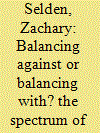

|
|
|
|
|
| Publication |
2013.
|
| Summary/Abstract |
During the 2001-2009 period when American foreign policy was internationally unpopular and perceived as unilateral, many states strengthened their security cooperation with the United States and facilitated the reach of the us military. This behavior spans a range of actions along a spectrum from reaffirming traditional alliances to far more subtle forms of alignment. This pattern is in large part driven by the actions of regional powers such as Russia and China whose rising power pushes neighboring states to seek the assurance of the United States, and it has distinct implications for the endurance of American hegemony. As those regional powers seek to expand their influence, secondary states may increase their contributions to the maintenance of American hegemony, thus helping to extend it well into the future. They are less prone to do so, however, if the United States follows a strategy of restraint that calls into question its willingness to defend its hegemony. Therefore, a policy focused on maintaining American military preeminence and the demonstrated willingness to use it may be what sustains the cooperation from second-tier states that helps to maintain American hegemony.
|
|
|
|
|
|
|
|
|
|
|
|
|
|
|
|
| 2 |
ID:
153551
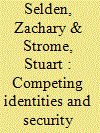

|
|
|
|
|
| Summary/Abstract |
The United States and India have forged a remarkably close security relationship since 2000, given the previous hostility of India to American foreign policy in general. Indian state identity until the mid-1990s was shaped by nonalignment and antipathy to the US-led liberal economic order. If identity is the source of interests, then how do states adopt policies that conflict with core elements of their identity when geopolitical shifts push states to adapt to a new regional balance of power? We argue that India did this by activating parts of the state identity that were compatible with American state identity and de-emphasizing those elements that were incompatible. But in doing so, Indian state identity changed, which impacts future foreign policy choices. This case illustrates the reciprocal relationship between security interests and state identity. We use content analysis of ten years of Indian media to demonstrate that the depiction of the US–Indian relationship increasingly focused on the democratic shared values of both states, despite beginning with an emphasis on military cooperation.
|
|
|
|
|
|
|
|
|
|
|
|
|
|
|
|
| 3 |
ID:
174078
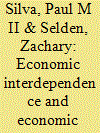

|
|
|
|
|
| Summary/Abstract |
Economic sanctions impose costs on sender as well as target states, and those costs increase with the degree of interdependence between the states in question. We test the hypothesis that EU member states that are more economically interdependent with Russia would be the most opposed to the imposition of sanctions on Russia in response to its actions in Ukraine in 2013–2014. However, an analysis of the debate over the imposition of sanctions shows the opposite: a modest positive correlation between economic interdependence and support for the sanctions among EU member states. This finding further calls into question the fundamental linkage between economic self-interest and conflict avoidance among interdependent states.
|
|
|
|
|
|
|
|
|
|
|
|
|
|
|
|
| 4 |
ID:
118196
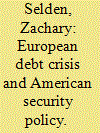

|
|
|
| 5 |
ID:
177940
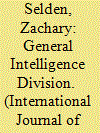

|
|
|
| 6 |
ID:
157529


|
|
|
|
|
| Summary/Abstract |
France is one of the most prominent European military powers and a strong proponent of an independent European military capability. Yet, France’s actions since 2009 suggest that it may be prioritizing the transatlantic relationship over the development of the European Union’s Common Security and Defence Policy. Does this signal a fundamental Atlanticist shift in the way that France envisions its future defence and security, or does it simply signal a temporary re-evaluation of French Europeanist security ambitions? Our analysis attempts to answer whether there is presently an Atlanticist shift evident in French foreign policy, and whether any such shift is rooted in a desire to preserve French influence through international institutions such as the North Atlantic Treaty Organization. This paper combines elite interviews with content analysis of French media comparing the current time with the mid-1990s to determine whether there is a shift in how defence and security issues are discussed and, if so, whether that signals a fundamental change. We find that, while there is a shift, it does not necessarily indicate a more Atlanticist posture, but suggests rather a pragmatic move to further French security goals through the most effective institutional mechanisms available.
|
|
|
|
|
|
|
|
|
|
|
|
|
|
|
|